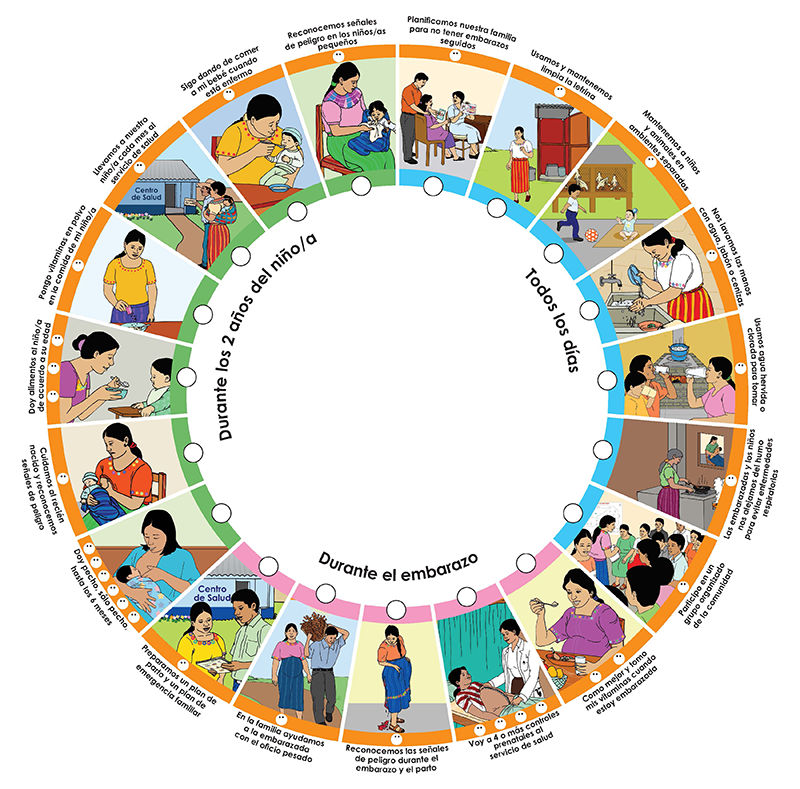The Wheel of Practices for Better Living guides families through the first 1000 days of a child’s life. Mother and daughter at the family farm, Chuabaj, Chichicastenango, Quiché. Photo credit: Claudia Valenzuela
Nutri-Salud: Community Nutrition and Health Project
The Challenge
The Western Highlands of Guatemala (Quiché, San Marcos, Huehuetenango, Totonicapán, Ixil, and Quetzaltenango) experience unique health challenges due to geographic isolation and poor economic and educational opportunities. The population of the Western Highlands suffers from higher-than-average levels of chronic malnutrition, and face challenges in accessing primary health care services, including maternal and child health services.
Overview and Objectives
Through the Nutri-Salud: Community Nutrition and Health Project, URC supported the Guatemalan Ministry of Health’s efforts to provide expanded health coverage at the community level in predominantly indigenous Mayan municipalities across 31 district health systems in the Western Highlands of Guatemala. The project’s main objectives sought to:
- Improve the nutritional status of women of reproductive age and children under five by implementing the seven essential nutrition actions, focusing on “the first thousand days” (i.e., during pregnancy and the first two years of life);
- Strengthen the quality of, access to, and demand for family planning, maternal, neonatal, and child health services at the community level, aiming for a permanent health care presence in target communities; and
- Engage communities in developing solutions to their health care needs through community mobilization, social and behavior change, information, education and communication, and links to local government services.
In 31 targeted municipalities, URC integrated these five components:
- Prevention of chronic malnutrition in children under five;
- Improved obstetric and neonatal care;
- Community- and facility-based integrated management of child illness;
- Community- and facility-based family planning services; and
- Community mobilization and links to local government for improved health and nutrition.
Achievements
URC supported the Ministry of Health (MOH) operationalize three unique service delivery models. The project provided support to improve several key processes fundamental to good primary health care practice. These processes included: improving providers’ knowledge and skills, continuous quality improvement, promoting the adoption of healthy practices to prevent malnutrition and improve maternal health, and strengthening community mobilization and local government engagement. Nutri-Salud strengthened the use of global evidence and best practices, adherence to national norms, and development and use of job aids and tools. The project wove gender mainstreaming and intercultural activities throughout its capacity-building approaches and maximized the opportunities to coordinate with other USAID/Guatemala projects working in health, education, family incomes, and local governance and with other donors, local governments, and local NGOs.
Nutri-Salud helped 31 municipal health districts transition service delivery models in line with central government changes by maintaining a focus on the use of data to improve coverage and quality of services, improving frontline providers’ knowledge and skills, supporting families to adopt practices known to prevent chronic malnutrition and improve health outcomes, and mobilizing communities and municipal governments to actively engage in solving health challenges.

One of Nutri-Salud’s key achievements was the development, field testing, and scale-up of an innovative community tool to help families prevent chronic malnutrition, the Wheel of Practices for Better Living. More than 55,000 families adopted the tool, which highlights 19 practices known to prevent chronic malnutrition and improve maternal health during the 1,000-day window of opportunity. The project developed an online course to strengthen the management skills of mid-level managers and implemented continuous quality improvement methodology and tools in 31 health districts. This led to measurable improvements in prenatal, postpartum, neonatal, and child health care.